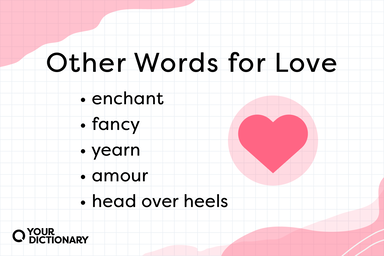Love Definition
- Out of compassion; with no thought for a reward:
She volunteers at the hospital for love.
- Under any circumstances. Usually used in negative sentences:
I would not do that for love or money.
- For the sake of; in consideration for:
did it all for the love of praise.
- Deeply or passionately enamored:
a young couple in love.
- Highly or immoderately fond:
in love with Japanese painting; in love with the sound of her own voice.
- No affection; animosity:
There's no love lost between them.
Idioms, Phrasal Verbs Related to Love
- for love
- for love or money
- for the love of
- in love
- no love lost
- fall in love (with)
- for love
- for the love of
- in love (with)
- make love
- no love lost between
- not for love or money
Origin of Love
-
From Middle English love, luve, from Old English lufu (“love, affection, desire"), from Proto-Germanic *lubō (“love"), from Proto-Indo-European *lewbÊ°-, *leubÊ°- (“love, care, desire"). Cognate with Old Frisian luve (“love"), Old High German luba (“love"). Related to Old English lÄ“of (“dear, beloved"), lÄ«efan (“to allow, approve of"), Latin libet, lubō (“to please") and Albanian lyp (“to beg, ask insistently"), lips (“to be demanded, needed"), Serbo-Croatian ljubiti, ljubav, Russian любовь (ljubovʹ), любить (ljubitʹ).
From Wiktionary
-
From Middle English loven, lovien, from Old English lofian (“to praise, exalt, appraise, value"), from Proto-Germanic *lubōnÄ… (“to praise, vow"), from *lubÄ… (“praise"), from Proto-Indo-European *leubÊ°- (“to like, love, desire"), *lewbÊ°-. Cognate with Scots love, lofe (“to praise, honour, esteem"), Dutch loven (“to praise"), German loben (“to praise"), Swedish lova (“to promise, pledge"), Icelandic lofa (“to promise"). See also lofe.
From Wiktionary
-
From Middle English loven, lovien, from Old English lufian (“to love, cherish, sow love to; fondle, caress; delight in, approve, practice"), from the noun lufu (“love"). See above. Compare West Frisian leavje (“to love"), German lieben (“to love").
From Wiktionary
-
The previously held belief that it originated from the French term l'Å“uf (“the egg"), due to its shape, is no longer widely accepted.
From Wiktionary
The closing-of-a-letter sense is presumably a truncation of With love or the like.
From Wiktionary
-
Middle English from Old English lufu leubh- in Indo-European roots
From American Heritage Dictionary of the English Language, 5th Edition
From the phrase Neither for love nor for money, meaning "nothing".
From Wiktionary
Related Articles
Love Is Also Mentioned In
Find Similar Words
Find similar words to love using the buttons below.





